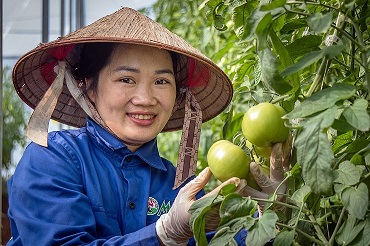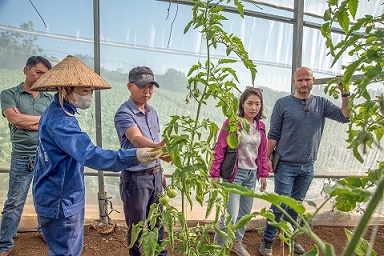Smart Farming in Viet Nam

- The 30-year-old vegetable farmer Do Thi Thuy
Do Thi Thuy is living proof that smart farming is the future of sustainable agri-food systems.
The 30-year-old vegetable farmer is helping break new ground for the future of sustainable agriculture in Viet Nam as part of an innovative FAO project “Smart Farming for the Future Generation” funded by the Government of the Republic of Korea and co-implemented by the Ministry of Agriculture and Rural Development.
As a farmer of tomatoes, cucumbers, runner beans and sweet pepper in the remote district of Moc Chau deep in northern Son La province, she is from one of 32 households that is witnessing first-hand how smart farming is a game-changer.
“The impacts are very encouraging. We participated in all training classes and field days organized by the project. All were very informative and useful. Now, we are seeing the results,” said Thuy.
The numbers tell the story: since joining the project, her average income from vegetable sales has doubled to VND 7-10 million (USD 290-415) per month.
These dramatic gains were realized through trainings and tailored technical support from FAO and Viet Nam’s Fruit and Vegetable Research Institute to each household to improve the production, post-harvest, food safety, and marketing of greenhouse vegetables through the application of scientific and evidence-based solutions, innovatory approaches, advanced technologies and practices.
This means households receive high-quality seedlings, fertilizers, agriculture technical tools and accessories, close technical support, monitoring, and on-the-job trainings throughout the crop cycle. The project team also conducts trainings to increase technical capacity in greenhouse vegetable cultivation, phytosanitary compliance, sustainable water, soil and plant nutrition management, and integrated pest management.
Put simply: the project finds affordable and clever ways for rural smallholder farmers to boost crop production, while using natural resources efficiently and without harming the environment.
“Compared to traditional vegetable cultivation, the project provided us with special fertigation programmes for different types of crops and different development stages of plants. This means our plants received well-balanced nutrition without fertilizer stresses,” said Thuy.
The five-year project, that concludes in June 2025 and is also being implemented in Uzbekistan as part of the USD 4.1 million funding package from the Government of the Republic of Korea, aims to increase the yield of beneficiary household crops by 130-150 percent, such as through the introduction of bumblebees for pollination and drip irrigation system.
To help achieve these goals, climate control systems are introduced with the installation of affordable digital sensors to collect real-time data for rapid response actions to optimize the use of water and nutrients. These efforts are further supported by the introduction of shade nets that provide cooling, roof-top zenithal ventilation to increase air circulation, and anti-insect nets that protect against pests and diseases.

- Field visit to Ms Thuy's vegetable garden in Moc Chau.
As a further example of the project’s impactful innovations, to address the critical issue of controlling soil-borne diseases, a soilless demonstration model will be introduced at the province’s High-tech Application Research Centre. Soilless agriculture is a cutting-edge approach that ensures high-quality produce free from soil health and fertility concerns. Over the long term, it is viewed as a potential substitute for land-based vegetable production.
Through using this sound scientific advice and evidence-based solutions, whether traditional or modern, the project is turning greenhouse farming into successful businesses. This means higher incomes for farmers like Thuy and increasing employment opportunities for communities, as well as offering more diverse, affordable and safer food, all year round.
With farmers like Thuy demonstrating that smart farming is the future of sustainable agri-food systems, the project is set to have a transformational impact in delivering prosperity to rural communities.
“Our children will benefit from better education because of the higher family income - from increased vegetable sales. We are very happy,” said Thuy.
